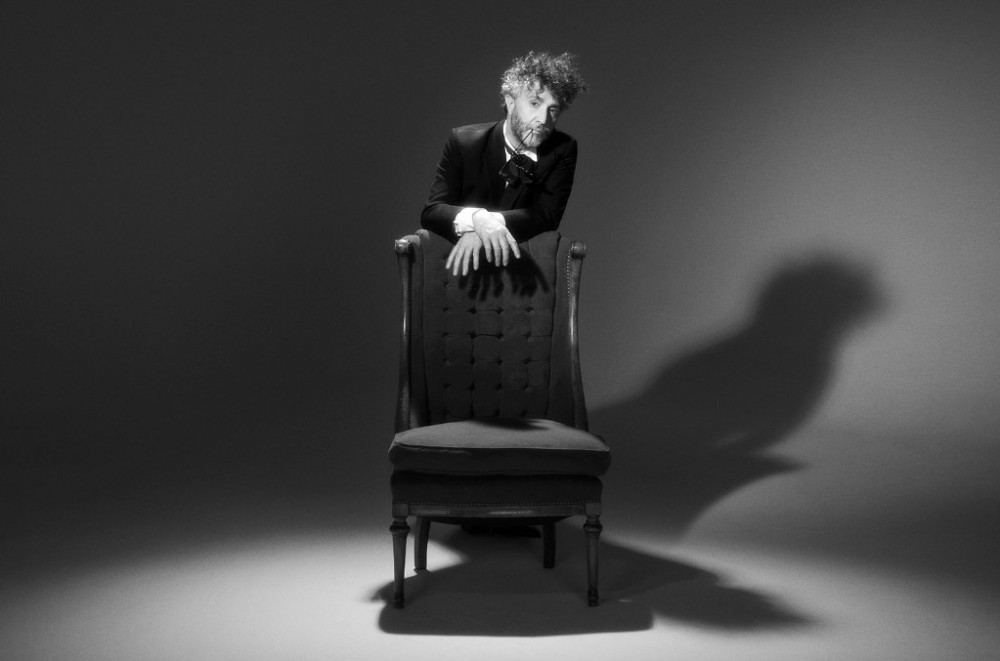The Argentine star's "La Conquista del Espacio" drops March 13.
On March 13, his birthday, Fito Páez will release his new album, La Conquista del Espacio (The Conquest of Space), in tandem with a concert at Hipódromo de Rosario in his hometown of Rosario, Argentina. It’s a grandiose title for a beautiful, lush set of songs that goes from the highly orchestrated, optimistically beautiful title track to the bluntly crass “Nadie Es de Nadie.”
Páez, an unabashed Beatles fans, traverses ballads and edgy fusion (cumbia and rock, anyone?), social commentary and love and loss. Páez spoke exclusively with Billboard, from Argentina, and he told us the stories behind the making of La Conquista, the meaning behind some of his choice tracks and why he loves working with Lali Esposito.
March 13 is your birthday. You usually release albums or launch tours on this date. Why are birthdays so important to you?
Because we have one more under our belt! And we still have a career. It’s important that my kids are well. And it’s important to still have the motor running and be on the search for different music and different arrangements. This is the first time I do orchestral arrangements so that’s also an important challenge in the music: Always sailing in the vast ocean of music that allows you to play so many games. Always looking to be happy as well, within all this.
The album — La Conquista del Espacio (The Conquest of Space) — takes its name from a very positive, triumphant, lush song. Is that how you feel? Positive and triumphant?
In a way, it’s personal. But it’s also in step with a moment in the world where many minorities are advocating for their rights and when this fight for equality that is being waged in the streets is a reality in the world and especially in the Americas. So, without really aiming to do that, I was able to insert the personal within a concept of conquests. And, on the other hand, the notion of conquering space is one of inhabiting your own space, your body. So there are many interpretations, infinite interpretations.
It’s a very Argentine, but a very global, album. Where was your head at when you started working on it?
You never know what you’re doing. The process started last March 13 in Trancoso, a little Brazilian village by the sea. And I went there with Diego Olivero, the co producer of the album, and we began to build these demos that I’d done during the last tour and trips. I went to write. It was about, “Let’s use this month to shape this album.” Writing is the backbone. There you determine the keys of the songs, the length, the initial lyrics. We spent 15, 20 feverish days where we didn’t know what would happen. La Conquista del Espacio was about reconfirming that I still wanted to be in the world, that I still had the desire to be here, generating concerts and music and doing things that —I wouldn’t say if the right term is, “for the common good,” as politicians say—but there’s a little bit of that. Because as artists we are incomplete if we don’t have other people’s ears, attention, critique.
My sense from you in the past two years is you’re in an almost manic creative state. As if your head is running faster than your fingers, if I’m making any sense.
It’s the truth. As I’m working on this album, I’m already working on two instrumental albums. I already have 80 minutes of music I want to record in June. I’m working on two films and a biopic. And raising children. So, there’s not much time for anything else, except maybe getting drunk once a week.
Let’s talk about the album. The first single, “Resucitar” (Revive) is very Beatles-esque. And of course, you’re a big fan…
Totally! Totally! That’s correct. I’m one of those people who’s proud to be included. Everything I learned from the Beatles is in there. The way I asked Guille to play bass is played similar to McCartney. Telling Abe Laboriel to play the drums a la Ringo Starr. Once I said that, we had the song in the first or second take. It was beautiful. And the song talks about this as well. It has to do with La Conquista del Espacio and the Phoenix. It’s about being reborn and stepping up again. In the song, one of the members of the couple says, “I really didn’t do things correctly and this had consequences in our relationship.” But despite that, we are going to be reborn and leave this toxicity behind. So it’s a very positive song and a very “Beatleanian” song.
And, speaking about The Beatles, you have a song called “Ey You,” although it sounds nothing like The Beatles…
It’s a song that had a lot of experimentation when it came to writing it. It speaks about a single topic: Gender violence and that we don’t like men who hit women. But at one point I started to talk about all forms of violence. And the song became a philosophical treaty about violence. So my friend Hernán “Mala Fama” Coronel, who does Argentine cumbia, I invited him to participate, and in the middle of it, he said something extraordinary. He said we want a song that speaks about a single subject but is beautiful for people to dance as well. So he removed all pretentions as a songwriter and he made me focus on genre violence. And I can’t thank him enough. It mixes Argentine cumbia, funk, rock, so you get a beautiful mess.
Talk to me about “Maelstrom”…
It’s a Swedish word that I took from an Edgar Allan Poe story called “Descent Into The Maelstrom.” It’s about a survivor of a phenomena called Maelstrom and he tells a tourist what happens during that phenomena. And that notion of the maelstrom, the storm, the disaster, allowed me to tell the story on surviving a season in hell survives. And how we all go through these seasons and when we go through them how much we value that experience and the joy of coming out. So it’s also a very celebratory song and a beautiful song and one of my favorites.
Fans may be surprised to hear you sing with Lali Esposito.
“Gente de la Calle” (People of the Street). Lali is an artist with a level of discipline that’s seldom seen. She’s not afraid of anything. Plus, I called her to participate in a song that’s melodically very difficult. She came to the studio on her own, we listened to the songs a couple of times, I gave her a couple of pointers, then I left for Los Angeles and Juan Apsak, the vocal producer, produced her here in Buenos Aires. The music is very lovely, a la Steely Dan, one of my favorite groups. But it talks about something very awful that’s happening here in Buenos Aires, but also in Los Angeles and Bogota, Lima, Rio de Janiero. There are a lot of people living and sleeping in the streets in very marginal conditions. And this song is a way of telling that. The song is not three-dimensional. It’s two people walking through the city and telling us what they see. So, there’s no political undertones here. It’s a faithful reflection of reality. So, it has this duality where the song pleasantly floats, yet the lyrics are harsh. This was the experiment I wanted to do: That with beautiful music you can tell terrible things.
Remind me, you usually write music or lyrics first?
Most recently I’ve been more focused on the music. I increasingly think music hides a secret. Each song holds a secret. And that secret needs to be discovered. And if it is, then the music deserves those lyrics. It’s a technique based on feelings. It’s subjective, because music can tell different things for different people. But at the end of the day, the albums have my name on them.
You say your heart has been broken and you’ve broken many hearts. But you’re in a good place: In love. Raising kids. What song sums up where you’re at now?
“Resucitar” is the song. I’m in a stable relationship with Maria Eugenia. She’s a beautiful person who allows me to be who I am. She doesn’t want me to be anyone else. There’s the famous saying: You fell in love with Che Guevara, you took him home and shaved his beard.” It’s not what happened with any of my exes. They’ve always been very generous with me. But Maria Eugenia is a woman who walks with me and I walk with her. We laugh together. And sometimes we get pissed off at each other, that’s life.
You recorded this album in Los Angeles. Was there any special meaning?
I’ve recorded in all the cities where I’ve had musical links. I was missing Los Angeles. I’m a son of Los Angeles in a way because I know all its story. And I was lucky to record it in Capitol Studios, the place where Frank Sinatra recorded the albums my father used to play for me when I was a child in Rosario. It was beautiful.
Before we leave, what would you like for your birthday?
A beautiful beer mug. From Prague, or one of those palces is a tradition. Or a guitar I don’t have. Like a 12-string Rickenbacker. Or a Bosendorfer or Steinway grand piano. That will make me happy.



